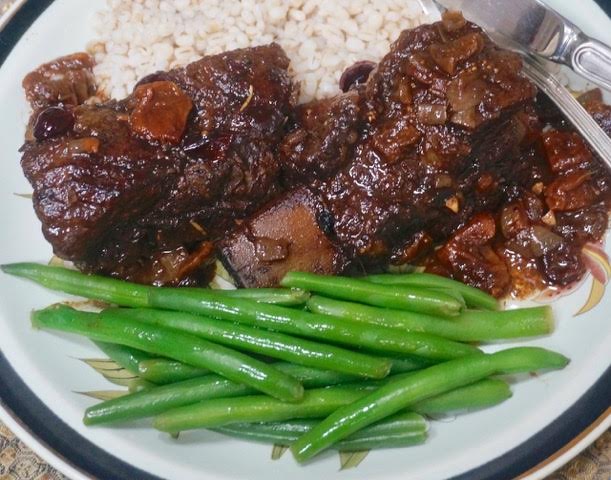Good Shabbos, Shabbat Shalom! This year, Tu B’Shvat, the New Year for the Trees, falls on Shabbat. We are familiar with the Passover Seder, but did you know that many people also celebrate Tu B’Shvat with a Seder, drinking wine and eating fruits in a specific order (or seder, in Hebrew)?
It is customary to drink four cups of wine – the first cup is all white, the second is mostly white, the third is half and half, and the fourth is all red. Twelve primary ‘fruits’ are recommended for a Tu B’Shvat Seder, including wheat, olives, dates, grapes, figs, pomegranates, and apples. Here are some helpful basics to get you started.
Cookbook author and food blogger, Ronnie Fein, kindly shared her mouthwatering recipe for Braised Short Ribs with Dried Fruit (below). It makes a perfect heartwarming main dish for Tu B’Shvat, especially with the wintery weather we are now experiencing. It includes a variety of dried fruits – dates, figs, dried apricots, and cranberries – plus succulent, meaty short ribs (or flanken) on a bed of barley. Ronnie Fein is the author of: Hip Kosher: 175 Easy-to-Prepare Recipes for Today’s Kosher Cooks and The Modern Kosher Kitchen: More than 125 Inspired Recipes for a New Generation of Kosher Cooks.
READ: SHARING CULINARY HERITAGE THROUGH NOSTALGIC RECIPES
Learn how to make a symbolic 7-Species Pomegranate-Shaped Challah from cookbook author Dahlia Abraham-Klein.
For last week’s recipes, click here.
Cookbook author Jamie Geller’s innovative recipe for Shivat Hamanim Salad (below) is also ideal for Tu B’Shvat because it combines the Shivat HaManim, the seven agricultural products enumerated in the Torah as special to the Land of Israel. Barley, wheat, figs, dates, grapes, pomegranates and olive (oil) are all represented in her creative, colorful salad. Jamie Geller also includes an excellent selection of menus suitable for both Shabbat and Tu B’Shvat on her website.
For dessert, keep it simple. Prepare a delicious, colourful fruit platter that includes the following: apples, cherries, dates, figs, grapefruits, kiwis, mandarins, mangoes, nectarines, oranges, papayas, passion fruit, peaches, lychees, pears, peaches, plums… so many choices! Colourful fruit skewers or a big fruit salad will also work well.
The kids can also help out with dessert by making Tu B’Shvat Fruit Plates, using the seven fruits of Israel, including pomegranates, dates, figs and grapes.
Chag Sameach, Shabbat Shalom!
RONNIE FEIN’S BRAISED SHORT RIBS WITH DRIED FRUIT (Meat)
Ronnie Fein writes: “This is a slow-cooked wonder that simmers for hours, giving off fragrant, welcoming vapours. It’s the kind of dish that makes everyone look forward to eating what’s in that pot. You can prepare it a day or so ahead. If you prefer, you can make it with flanken (it’s the same cut, but butchered differently) and use a variety of dried fruit. I’ve included dates and figs, because they are traditional for Tu B’Shvat, but also dried apricots and cranberries because they add a lush, tangy flavor. This dish is perfect with wheat (cooked pasta or bulgur) or with cooked barley, grains that are also traditional on Tu B’Shvat.
Prep time: 30 minutes
Cooking time: 3 hours
4 pounds short ribs (with bone)
1/4 cup all-purpose flour
2 Tbsp olive oil
2 large onions, coarsely chopped
2 large cloves garlic, chopped
1 Tbsp chopped fresh ginger
3 Tbsp balsamic vinegar
1 Tbsp Dijon mustard
2 cups red wine
Salt and freshly ground black pepper to taste
1 Tbsp chopped fresh rosemary or 1 teaspoon crushed, dried rosemary
8 whole cloves
2 cups mixed, chopped or small dried fruit such as apricots, dates, figs, cranberries, raisins, cherries
- Pat the ribs dry. Dredge the meat in the flour, coating all sides.
- Heat the olive oil in a large sauté pan over medium-high heat. Cook the ribs a few pieces at a time, for 8-10 minutes, turning them occasionally, to brown all sides. Remove the meat to a plate and set aside.
- Add the onions to pan, lower the heat to medium and cook, stirring, for 2-3 minutes. Add the garlic and ginger and cook briefly.
- Mix the balsamic vinegar and mustard, mix them with the wine and pour the liquid into the pan. Return the meat to pan. Sprinkle with salt and pepper if desired. Place the rosemary on top. Scatter the cloves around the pan.
- Bring the liquid to a simmer and turn the heat to low. Cover the pan and cook for about 2-1/2 hours or until the meat is tender.
- Add the dried fruit to the pan. Cook for another 30 minutes or until the dried fruit has softened. Remove the cloves.
Makes 4 servings
JAMIE GELLER’S SHIVAT HAMANIM SALAD (Pareve)
Cookbook author, Jamie Geller, who now lives in Israel with her family, created this innovative salad that originally appeared in The Joy of Kosher with Jamie Geller Magazine (Winter, 2012).
3 cups cooked barley or Israeli couscous (such as Osem Israeli (pearl) Couscous)
1/4 cup dried figs, chopped or 3 fresh figs, quartered
1/4 cup pitted dates, sliced in rings or chopped
1/4 cup seedless grapes, halved
1/4 cup pomegranate seeds
1/4 cup extra-virgin olive oil
2 Tbsp honey
2 Tbsp red wine vinegar
1 Tbsp Dijon mustard
1/4 cup wheat and barley nuggets cereal (such as Grape-Nuts), optional
2 tablespoons chopped parsley leaves
- Combine barley, figs, dates, grapes and pomegranate seeds in a large bowl.
- Place oil, honey, vinegar and mustard in a small bowl and whisk to combine.
- Pour dressing over barley salad and toss to coat well.
- Just before serving, add cereal and toss to evenly distribute. Garnish with parsley leaves.
Makes 4-6 servings
Norene Gilletz is the leading author of kosher cookbooks in Canada. She is the author of twelve cookbooks and divides her time between work as a food writer, food manufacturer, consultant, spokesperson, cooking instructor, lecturer, and cookbook editor. Norene lives in Toronto, Canada and her motto is “Food that’s good for you should taste good!” For more information, visit her website at www.gourmania.com or email her at [email protected].







